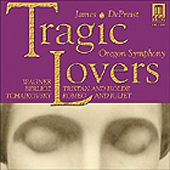
COLLECTIONS

Collections or compilations of varied works by different composers are not my cup of tea, simply because the mood or sonic ambience keeps fluctuating from one track to the next, with
no clear link or concept from one to another, making the whole thing seem empty. This collection, on the other hand, employs a concept that works because the emotional substance and
subject matter of each piece is the same. As a matter of fact, if you close your eyes and try real hard, it almost sounds like a three movement symphony.
The Prelude and Liebestod from Tristan und Isolde by Richard Wagner, works perfectly as the first movement, by setting the tone and subject matter
of all the music to come. It opens quietly, with two very simple chromatic motives, one descending and one ascending, constantly driving each other forward, and representing the two
main characters derived from Medieval legend. The whole thing builds emotional tension very slowly, until it finally reaches a superb musical and emotional climax, which then gently
fades to a depiction of sublime love.
Then from Hector Berlioz comes the Scène d'amour from Romeo et Juliette, which, by nature of its more pleasant mood and lighter
musical textures, fits very well into the role of central movement to our fabricated symphony. Most of his life, Berlioz was fascinated by Shakespeare and fixated
on the subject of Romeo and Juliet and their representation of love against all odds. This work, considered a dramatic symphony, raised his reputation in musical circles. Even the
young Wagner at the time regarded it as an important new chapter in music.
Then comes the dramatic and tumultuous final movement to our symphonic work. And who better to fit that role than Piotr Tchaikovsky and his powerful Romeo
and Juliet Fantasy-Overture. It also begins slowly and quietly, foretelling the tragedy to follow. Eventually, intense battles between the Montagues and Capulets arise,
with great cymbal crashes representing the clashing of swords. Once the fighting ends, the greatest love theme of all times, since then forever copied (good or bad) to portray love
in movies, makes its appearance and gradually swells and recedes a few times. The fighting returns, only to intensify their love for each other, which again rises to a gushing
climax of emotion followed by more intense battles which finally kill Romeo. The depiction of sorrow that follows is one of the most gripping passages in music, which is then
surpassed by a portrayal of life affirming love even after death. Then the work ends in true dramatic fashion, which caps off our make-believe symphony very well.
James DePreist and the Oregon Symphony Orchestra attain great heights in this recording. The massive walls of sound the string sections produce
during the intense sections are trully impressive, and the percussion and cymbal bursts will rattle your bones. The conductor and musicians are well aware of the profound emotions
depicted in these pieces, and are not shy in conveying them loud and clear. The Delos recording captures the sound of this large orchestra very well with clean and powerful dynamics
throughout.
This perfectly coordinated collection should be part of every collection!
Jean-Yves Duperron